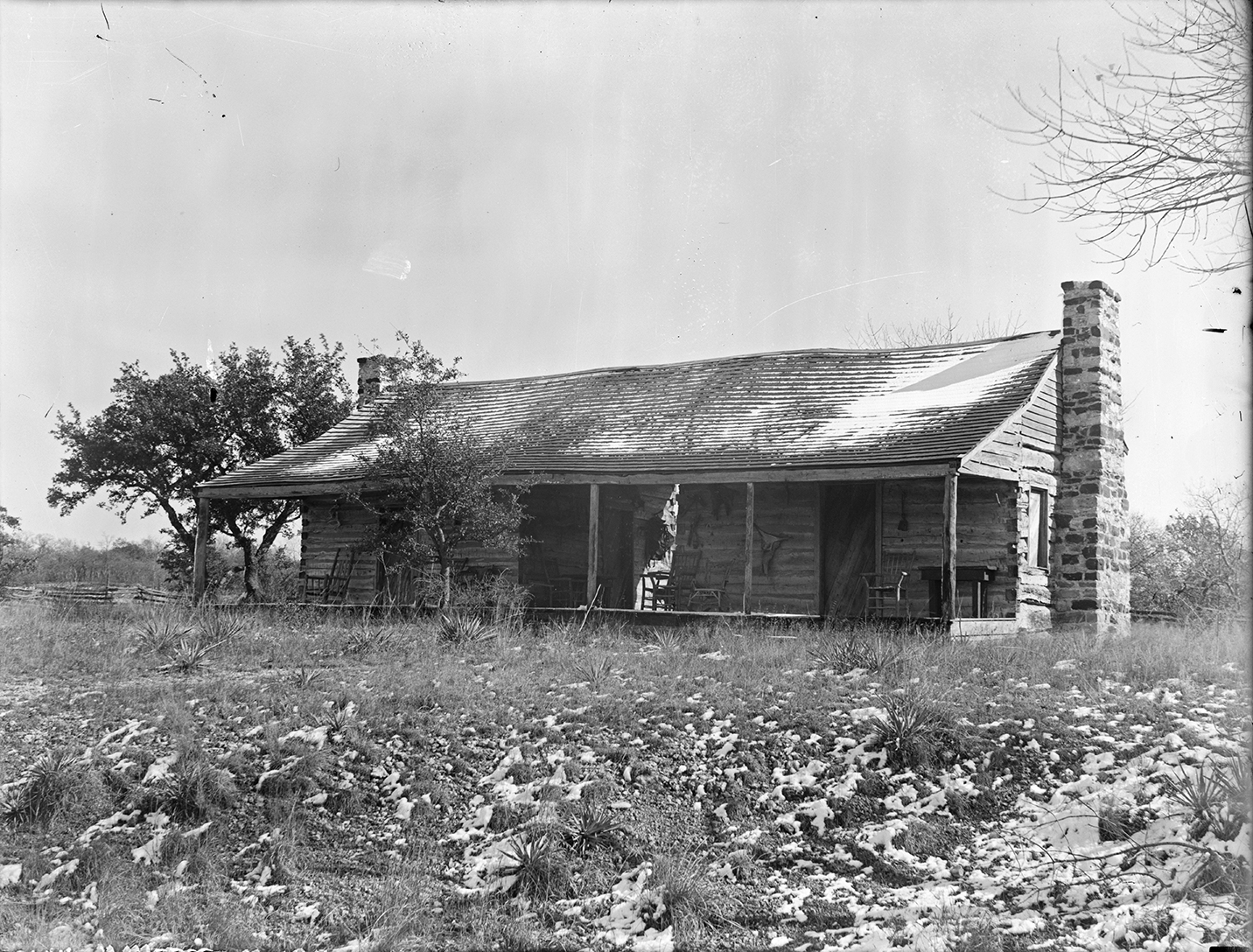Image: The Cynthia Ann Parker House in Fort Worth, Texas. Image credit: University of Texas at Arlington Libraries, Special Collections.
My family on my mother’s side is Irish, English, Scottish, French, and Native American (Comanche). I don’t know much about how my European ancestors came to the United States.
I know a little more about my Native American heritage, but not much. Mostly I know one story. Here is the story as my great-grandmother told it to me: One of my ancestors was a woman named Cynthia Ann Parker. She was kidnapped by a Comanche tribe when she was nine years old, but assimilated into the tribe and led a happy life. She married a chieftain and had a family, including a son, Quanah Parker, who was the last free chief of a powerful Comanche tribe before the tribe surrendered and went to a reservation. As an adult, Cynthia Ann was rescued by the Texas Rangers and reunited with her birth family. She escaped and returned to her husband and children, only to be rescued again. She refused to eat after the second “rescue” and died.
Cynthia Ann’s son, Quanah Parker, was a somewhat controversial figure. He adopted much of his mother’s white culture. He spent time with his mother’s family, the Parkers, and learned farming techniques and other things from them. But he adhered to Comanche culture in many other ways—he wore braids, took several wives, and practiced peyote religion. He was famous for saying this about the Native American Church: “The White Man goes into his church and talks about Jesus. The Indian goes into his tipi and talks with Jesus.”
From what I’ve read, Quanah Parker managed to gain the respect of European settlers and became a sort of liaison between them and his tribe. He seemed to have embraced and felt comfortable with all aspects of his own cultural identity, which seems very unusual and interesting to me for the time.
When I think about my own heritage, I usually think more about my great-grandparents, Benjamin Butler Owens and Cynthia Ann Collins Owens, who lived in Oklahoma, and their youngest daughter, my grandmother Rubye Ione Owens Calvert, who moved to California with her new husband, my grandfather Arvil Lee Calvert, to find work during the Dust Bowl era. They lived in farm camps and eventually made a good life for themselves. They worked hard and endured a lot of hardships. I loved them both very much.
After my mother’s family moved here from Oklahoma during the Dust Bowl, they began farming in the Salinas Valley. My grandparents had more opportunities to rise above their circumstances than people of color did. Hispanics/Latinx in the farm labor camps endured much worse conditions and had a much more difficult time making it out of the camps. My grandfather’s light skin made it relatively easy for him to eventually become a ranch foreman. But I’m proud of my grandparents for having the courage and the strength to start a new life in California. Starting over isn’t easy. Meanwhile, people of color continued to be exploited in the fields throughout the farm labor strikes in the 1970s and to this day.
My great-grandmother Cynthia Ann Collins Owens told me stories which had been passed down to her about the Trail of Tears (the forced relocation of several Native American tribes to Indian Territory in Oklahoma). She told me stories about things like doing her laundry by hand in caves in Oklahoma and about taking in a couple of strangers for the night (which people did in those days) and finding out after they’d gone that they were wanted for murder. She taught me things about our family’s cultural superstitions, too, like to eat black-eyed peas for good luck and to never wear opals—they are bad luck.
Many of my relatives on my mom’s side had Native American features or coloring, but I am light-skinned and have red hair, like my Irish great-great-great-grandmother, I am told. My middle name, Leanne, is a combination of my grandfather Arvil Lee’s middle name, Lee, and my great-grandmother Cynthia Ann’s middle name, Ann.
My family on both sides migrated to California. My dad’s family moved here from Arkansas and worked picking fruit, following the harvest, so they moved around a lot—so much so that my father quit school in 9th grade because he was so tired of moving and having to adjust and make new friends.
Although I didn’t feel that way at the time, I now feel fortunate that, when I was growing up, my father served in the military, and we moved around a lot. I hated moving so much at the time, like my father had hated it. I spent many hours in the library, losing myself in books, and they became my friends. I guess it’s no wonder that now, when I write short stories, the theme often deals with difficulty adapting to change or accepting loss.
I’ve enjoyed reading literature that portrays my own family’s culture and history and that describes places and people with which I’m familiar. In particular, John Steinbeck’s books influenced me as a writer. Although I didn’t have those same experiences that are portrayed in his books, my parents and grandparents did, and they brought many of their traditions and customs to California with them. Reading those books makes me feel very connected to my heritage and to my family and to the places I’ve known all my life.
I think it’s important for everyone to have that experience with literature from their own cultures. Author Laurence Yep recounts that he finally got published when he began writing from his own experience. But it’s also crucial to read literature from other cultures. I only recently realized how little literature I’ve read from the Hispanic/Latinx culture which makes up nearly half of the population of my home state of California. I’m working on rectifying that.
While a person of color growing up in the United States has to immerse themself in white culture to a large degree, a white person growing up in the United States doesn’t have to immerse themself in anyone’s culture but their own. A person of color can more easily write a white character, I think, than a white person can write a person of color. It’s for this reason white writers must work harder to get it right if they choose to write a character from outside their experience.
I’m sharing these things with you because I know how reading a wide variety of literature from other cultures has enriched my life. I am not sure what led me on that path, but whatever it was, I am grateful and feel blessed by it. It has made me the woman I am and the writer I am becoming. I have come to believe that one of the most important things we can do is to read literature from many different cultures with our children. Literature is perhaps the most influential of the arts in terms of helping us to understand cultures other than our own. And, as author Nikki Grimes has said, reading the literature of other cultures teaches us “the ways that we are all alike beneath the skin.”

